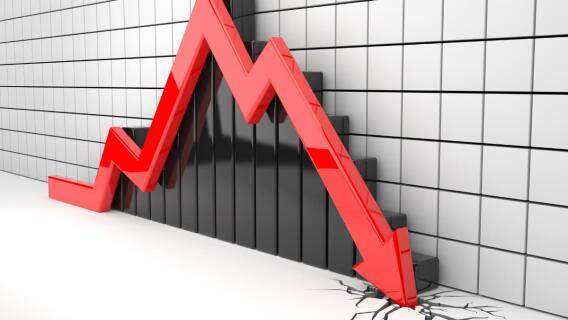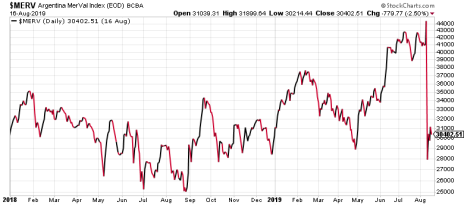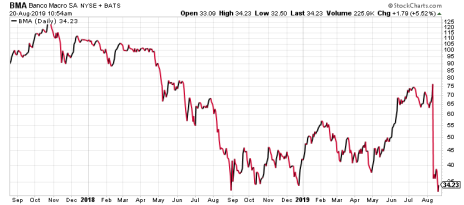Last Week’s Near-Record Cratering in Argentina Stocks Serves as a Cautionary Tale for Global Investors
Eighteen months ago, the Argentina stock market was flying high.
The Merval, Argentina’s benchmark index, had just topped out at all-time highs above 35,000, having nearly doubled in 2017 and more than tripled since the beginning of 2016. And Argentina’s economy – the second-largest in South America behind Brazil’s – was humming, with GDP climbing 4.1% in the first quarter of 2018.
[text_ad use_post='129628']
Here’s what’s happened to the Merval since that January 2018 top:
The Overnight Argentina Stock Market Crash
Things actually looked OK, if a bit choppy…until last week. The Merval plummeted a hard-to-believe 48% in one trading day, the second-largest single-day drop in the history of the global stock market.
The instant tailspin in Argentina stocks was in response to several macro factors: 1) current president Mauricio Macri lost a primary election to far-left opposition candidate Alberto Fernandez, whose running mate is former president Cristina Kirchner; 2) inflation is at 55% (!); 3) the Argentine peso plunged 15% against the U.S. dollar, and 4) the country’s sovereign debt ratings were downgraded by both S&P Global and Fitch Ratings.
So, yeah, that’s a bad week!
I doubt many of you were heavily invested in the Argentina stock market. Or at least I hope you weren’t. There are only 17 Argentina ADRs (American Depositary Receipts) that trade on U.S. exchanges anyway. But Argentina stocks had been on a tear since the beginning of May, spiking to new all-time highs above 44,000 on August 9—less than two weeks ago! So it’s possible you had taken a flyer on one or two Argentina stocks based on that momentum.
Clearly, that momentum was a mirage. And the signs of major comedown should have been obvious even before the primary election surprise and the credit downgrades.
For starters, the inflation rate was already astronomical, at 47.8% in 2018. Second, the country is in a full-on recession, with GDP declining for four straight quarters – or all four since that 4.1% first-quarter 2018 growth – including a 5.8% decline in the first quarter of 2019 (second-quarter GDP numbers aren’t out yet). And roughly one-third of the country’s population is in poverty.
Carl Delfeld, chief analyst of our Cabot Global Stocks Explorer advisory, says that Argentina doesn’t even qualify as an emerging market at the moment, calling it more of a frontier market, even though it’s listed in the MSCI Emerging Markets Index.
Two years ago, the Merval was one of the best-performing stock markets in the world. And if you bought a stock like MecadoLibre (MELI), the e-commerce giant that’s up 458% in the past five years even after last week’s crash, you’re one of the lucky ones who capitalized on Argentina’s fleeting market boom.
But most Argentina ADRs have long-term charts that look like this (of Banco Macro (BMA), the second-largest bank in Argentina):
Bottom line: If you’re looking to capitalize on global growth, there are far better places to invest your money than Argentina. The country just has way too many problems right now to trust any market rally—that May-through-July run-up had more empty calories than a bag of Doritos.
Better International Opportunities Out There
Yes, Chinese stocks aren’t terribly appealing at the moment either thanks to the ongoing trade war. And most Canadian stocks offer only slow growth. But there are plenty of extremely appetizing alternatives, and Carl Delfeld is dipping his toe into many of them in Cabot Global Stocks Explorer, an advisory whose name we just changed from Cabot Emerging Markets Investor so that Carl could take advantage of growth in non-emerging markets—in all corners of the globe.
In fact, his latest recommendation comes from a developed market that’s far outside U.S. borders. To learn its name, or the names of any of his 11 other portfolio holdings (average return: +19.4%), click here.
In the meantime, steer far clear of all things Argentina!
[author_ad]



